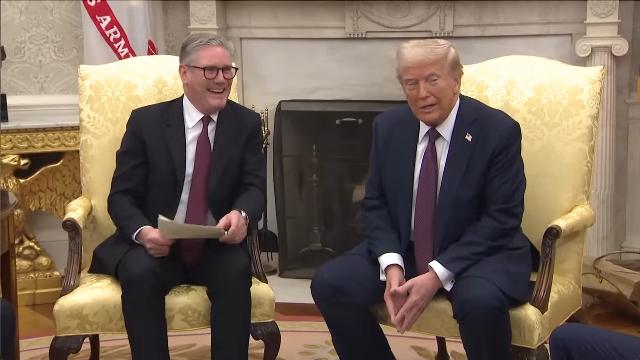Trump announces another tariff win, this time with the UK
When Trump announced all his tariffs, naysayers (everyone on the left and some on the right) said that it would quickly destroy the American economy. The immediate stock market drop following the new tariffs seemed to reflect this. Some of us, though, thought that Trump was doing what needed to be done, and events seem to be supporting that take.
Even those who agreed that China needs to be brought to heel and that the rest of the world has been taking gross advantage of American trade inequity argued that doing everything at once was unsustainable. The system wouldn’t be able to stand the shock and, most scarily of all, we’d see a Smoot-Hawley style stock market collapse.
I disagreed. For one thing, while America was a creditor nation in the 1920s (we needed the world to buy our stuff), now it’s a debtor nation (the world needs America to buy its stuff).

For another thing, the stock market in the 1920s was roaring in part because so many people were buying on the margin, with vast cohorts borrowing from their brokers up to 90% of the stock purchase price. The whole thing was a bubble. You can still buy on the margin now, but it’s much more limited and regulated.
As for the speed with which Trump moved, I’ve argued that he had no choice. He could not engage in leisurely negotiations with individual nations or even batches of nations, respectfully asking them to lower their tariffs. Unless we raised our tariffs, they had no incentive to do so.
Moreover, Trump has less than two years to remake America’s trade and, most importantly, clip China’s wings. That’s because midterms are looming. If Republicans lose, all is lost. Trump needed everything locked up quick—the trade wars, China being put in the box, and the inevitable stock market adjustment.
Currently, Trump’s necessary gamble seems to be working. Manufacturers are returning to America (most recently, Volkswagen). China, having initially taken a hard line, is willing to talk tariffs. And, in the latest victory, Trump says that the UK and the US have agreed upon a new deal, too:
The agreement with the United Kingdom is a full and comprehensive one that will cement the relationship between the United States and the United Kingdom for many years to come. Because of our long time history and allegiance together, it is a great honor to have the United Kingdom as our FIRST announcement. Many other deals, which are in serious stages of negotiation, to follow!
Frankly, as to the UK, it doesn’t need to be a major victory. It just needs to be a “better than before” victory. After all, the real target of all these negotiations is China.
If Trump can get countries behind him on new trade deals that benefit America, even if only slightly, China gets increasingly marginalized on the world trade stage. Suddenly, there’s more leverage in Trump’s ability to negotiate with a nation that has the world’s savviest (and, next to Iran, most dishonest) negotiators.
The market, by the way, is responding nicely to the news from the last couple of days:
Stocks were higher Thursday after President Donald Trump announced that a trade deal between the U.S. and United Kingdom had been struck.
The Dow Jones Industrial Average gained 205 points, or 0.5%. The S&P 500 gained 0.5%, and the Nasdaq Composite advanced 0.7%.
As the old saying goes, “there’s many a slip ‘twixt cup and lip.” Things can still go wrong, so I’m warning myself not to “count my chickens before they hatch.” Or, as the Yiddish saying goes, “Der Mann Tracht, un Gott Lacht,” or “Man plans and God laughs.” (The old timers really liked to keep people from getting hubristic about their plans.)
So, while it looks as if Trump’s tariff plan is succeeding, I’ll wait to celebrate. Nevertheless, I do feel a celebration is a little bit closer.





